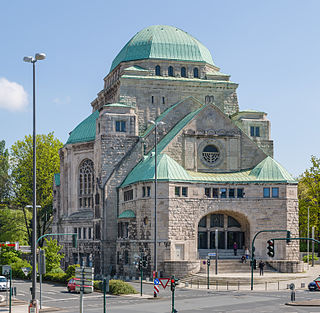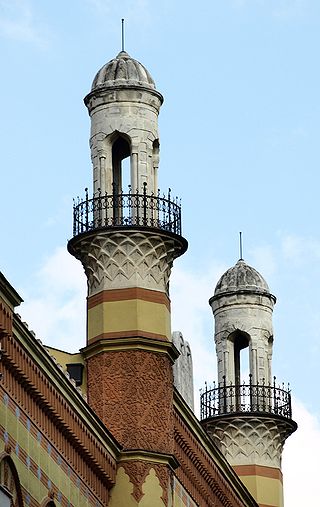
The Old Synagogue is a former Reform Jewish congregation and synagogue, located at Steeler Straße 29, in Essen, in the state of North Rhine-Westphalia, Germany. The former synagogue was repurposed in 1960 as a Jewish museum.

The history of the Jews in the Netherlands largely dates to the late 16th century and 17th century, when Sephardic Jews from Portugal and Spain began to settle in Amsterdam and a few other Dutch cities, because the Netherlands was an unusual center of religious tolerance. Since Portuguese Jews had not lived under rabbinic authority for decades, the first generation of those embracing their ancestral religion had to be formally instructed in Jewish belief and practice. This contrasts with Ashkenazi Jews from central Europe, who, although persecuted, lived in organized communities. Seventeenth-century Amsterdam was referred to as the "Dutch Jerusalem" for its importance as a center of Jewish life. In the mid 17th century, Ashkenazi Jews from central and eastern Europe migrated. Both groups migrated for reasons of religious liberty, to escape persecution, now able to live openly as Jews in separate organized, autonomous Jewish communities under rabbinic authority. They were also drawn by the economic opportunities in the Netherlands, a major hub in world trade.

The World Union for Progressive Judaism (WUPJ) is the international umbrella organization for the various branches of Reform, Liberal and Progressive Judaism, as well as the separate Reconstructionist Judaism. The WUPJ is based in 40 countries with 1,275 affiliated synagogues, of which 1,170 are Reform, Progressive, or Liberal and 105 Reconstructionist. It claims to represent a total of some 1.8 million people, both registered constituents and non-member identifiers. The WUPJ states that it aims to create common ground between its constituents and to promote Progressive Judaism in places where individuals and groups are seeking authentic, yet modern ways of expressing themselves as Jews. It seeks to preserve Jewish integrity wherever Jews live, to encourage integration without assimilation, to deal with modernity while preserving the Jewish experience, and to strive for equal rights and social justice.

The history of the Jews in Indonesia began with the arrival of early European explorers and settlers, and the first Jews arrived in the 17th century. Most Indonesian Jews arrived from Southern Europe, the United Kingdom, the Netherlands, Belgium, Germany, France, the Middle East, North Africa, India, China, and Latin America. Jews in Indonesia presently form a very small Jewish community of about 500–1,000, from a nadir of about 20 in 1997. Judaism is not recognized as one of the country's six major religions, however its practices are allowed under Perpres 1965 No. 1 and article 29 paragraph 2 of the Constitution of Indonesia. Therefore, members of the local Jewish community have to choose to register as "Belief in One Almighty God" or another recognized religions on their official identity cards.
The Nederlands-Israëlitisch Kerkgenootschap (NIK) is the umbrella organisation for most Ashkenazi Jewish communities in the Netherlands, and is Orthodox in nature, while to be described as traditional in outlook. The expression Orthodox, is for the Dutch situation at least, of a later date than the existence of the congregations that make up the NIK and the NIK itself. The Rabbi of the NIK is Rabbi Dr. Raphael Evers. In total, the NIK has some 20 rabbis actively working in 18 congregations throughout the country, serving some 5,000 Jews.

Beit Ha'Chidush, abbreviated as BHC is a Progressive Jewish congregation, located in Amsterdam, in the North Holland region of The Netherlands. The congregation was founded in 1995 by predominately expatriate Jews with secular and religious backgrounds who wanted to create a welcoming, inspiring and renewed Jewish congregation.

The Portuguese Synagogue, also known as the Esnoga, or Snoge, is an Orthodox Jewish congregation and synagogue, located at Mr. Visserplein 3 in Central Amsterdam, Amsterdam, in the North Holland region of The Netherlands. The synagogue was completed in 1675. Esnoga is the word for synagogue in Judaeo-Spanish, the traditional Judaeo-Spanish language of Sephardi Jews.

The New Synagogue was a former Reform Jewish congregation and synagogue, located in Oppeln, Germany. The synagogue was destroyed by Nazis on November 9, 1938, during Kristallnacht.

The Mikvé Israel-Emanuel Synagogue, is a Reconstructionist Jewish congregation and synagogue, located at Hanchi di Snoa 29, Punda, in the city of Willemstad, Curaçao, a constituent country of the Kingdom of the Netherlands in southern Caribbean Sea. The congregation was established in 1651 and the synagogue was completed in 1732, making it the oldest surviving synagogue in the Americas.

The history of the Jews in Amsterdam focuses on the historical center of the Dutch Jewish community, comprising both Portuguese Jews originally from both Spain and Portugal and Ashkenazi Jews, originally from central Europe. The two separate groups have had a continuing presence since the seventeenth century. Amsterdam has been called a Jerusalem of the West and the "Dutch Jerusalem". The Holocaust in the Netherlands devastated the Jewish community, with the Nazis murdering over 80% of Amsterdam's 79,000 Jews, but the community has managed to rebuild a vibrant and living Jewish life for its approximately 15,000 present members.

The Oni Synagogue is an Orthodox Jewish congregation and synagogue, located at 53 Vakhtang VI Street in Oni, in the Racha region of Republic of Georgia. The Oni synagogue was built in 1895 and is the oldest functioning synagogue in Georgia.

The Rumbach Street Synagogue, also called the Status Quo Ante Synagogue, is a Neológ congregation and synagogue, located in Belváros, the inner city of the historical old town of Pest, in the eastern section of Budapest, Hungary. Since 2021, the building has also been used as a concert hall and Jewish museum.

The Beth Israel Synagogue is a Progressive Jewish congregation and synagogue, located at Adriaan Laclé Boulevard 2, in Oranjestad, Aruba. Established as a congregation in 1956, the synagogue was completed in 1962. The Aruban Jewish community is an independent congregation with a liberal style similar to Reform or Conservative Judaism.

The Westminster Synagogue is an independent Progressive Jewish congregation and synagogue, located near Hyde Park, in Central London, England, in the United Kingdom. The synagogue is located in Kent House, a restored Victorian town house in Knightsbridge. The building, which dates from the late 1800s, also houses the Czech Memorial Scrolls Centre.

The Great Synagogue of Deventer is a former Jewish congregation and synagogue, located at Golstraat 23, in the city of Deventer, in the Overijssel region of The Netherlands. Designed by J. A. Mulock Houwer in a mix of the Renaissance Revival and Moorish Revival styles, the synagogue was completed in 1892.
The Dutch Israelite Religious Community of The Hague is the Ashkenazi Orthodox Jewish community in The Hague and is a member of the Nederlands-Israëlitisch Kerkgenootschap (NIK).
Hannah Nathans is an author and spiritual counselor. She is currently working as rabbi of the Open Jewish Congregation Klal Israel in Delft, and is leading HaMakor for the Centre for Jewish Spirituality.

The Wittlich Synagogue is a former Jewish congregation and synagogue, located on Himmeroder Straße 44, in Wittlich, in the state of Rhineland-Palatinate, Germany. Designed by Johannes Vieknen in the Art Nouveau style and completed in 1910, the synagogue was the main place of worship for the city's Ashkenazi Jewish community until 1938.

The Aalten Synagogue is a Jewish congregation and synagogue, located at Stationsstraat 7, in the city of Aalten, in the Gelderland province of the Netherlands. The synagogue was completed in 1857, fell into disuse after World War II, was subsequently restored and reconsecrated in 1986.

The Gerard Doustraat Synagogue is an Orthodox Jewish congregation and synagogue, located at Gerard Doustraat 238, in the de Pijp neighborhood of South Amsterdam, in North Holland, the Netherlands. Designed by architect E. M. Rood in the Renaissance Revival style, the synagogue was completed in 1892.

















